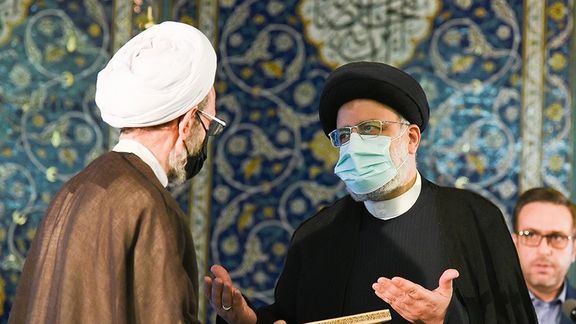Fast Rising Prices Overshadow All Issues In Iranian Politics

As food prices continue to rise in Iran prompting general anger, Tehran’s conservative prayer Imam on Tuesday had to acknowledge that people want solutions.

As food prices continue to rise in Iran prompting general anger, Tehran’s conservative prayer Imam on Tuesday had to acknowledge that people want solutions.
While Conservative President Ebrahim Raisi took office last August, claiming to be able to quickly control inflation, price rises have accelerated in the past 8 months. Attempts by him and his supporters to blame his predecessor for the crisis increasingly sound hollow. Even many conservatives and regime loyalists have begun asking for solutions.
Prices for essential food itams such as sugar, oil, flour, bread and pasta have dramatically increased in the past few weeks.
"Last year, the average price for each kilogram of pulses was between 500,000 and 750,000 rials (or $2 to $3),” said Abdi Eftekhari, secretary of Iran’s Pulses Union. He put current prices 70 to 120 percent higher.
Eftekhari noted a rise in global inflation due mainly to the Russia-Ukraine conflict, given the two countries’ role as major exporters of agricultural produce, including wheat.
The head of the directing board of Iran’s Pasta Factories Association, Mehrdad Nouri, recently said that 70 percent of the cost of producing pasta depended on the cost of flour. Recent years, he explained, had seen a decline in Iran’s cultivation of durum wheat − also called pasta wheat or macaroni wheat − from which semolina flour is made, even though private producers have encouraged farmers by paying above the government-approved rate.
But the main reason for soaring prices is an economy in crisis, with ballooning liquidity, above 40-percent inflation, and a government unwilling to make a nuclear deal with the United States to lift criplling sanctions.
Hoarded vegetable oil
Abolhassan Khalili, chairman of Iran's Vegetable Oil Trade Union, has attributed the rising price of vegetable oil to both the Ukraine crisis and hoarding by producers and brokers expecting further price hikes. Raw vegetable oil, which is imported, has risen 60 percent due to the Ukraine crisis, Khalili said.
First vice-President Mohammad Mokhber said Monday that the government’s elimination of a lower dollar rate for essential food imports had led to price rises for some items, although there was “abundance of basic goods in the country.” He said prices had risen 70 percent globally, apparently referring to the Ukraine crisis. Officials have generally claimed Iran has adequate stores of sugar, oil and other necessities.
Consumer price inflation in Iran has been above 30 percent since the United States imposed ‘maximum pressure’ sanctions in 2018. But food prices have risen faster, with government figures showing 60 percent year-on-year inflation in 2021.
Rice price
In an interview with ILNA published Sunday, Shahriar Haydari, a member of the parliament's National Security and Foreign Policy Committee, claimed high inflation was not due to international factors but to a lack of integrated management. “The increase in the price of eggs, yogurt, buttermilk and meat has nothing to do with the United States and sanctions,” he said.
Prices for most essential goods are nominally fixed by the government, but the private sector often disregards the guidelines. In recent months, prices for rice, the main staple, have fluctuated widely, but are now 1,000,000 rials (about $4) per kilogram, enough for a meal for five to eight people. The average salary, according to the Ministry of Labor, is the equivalent of $150 a month.